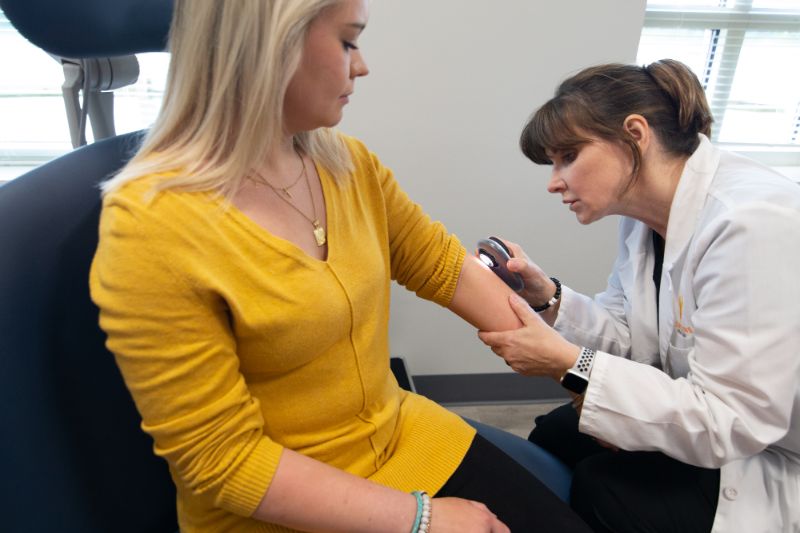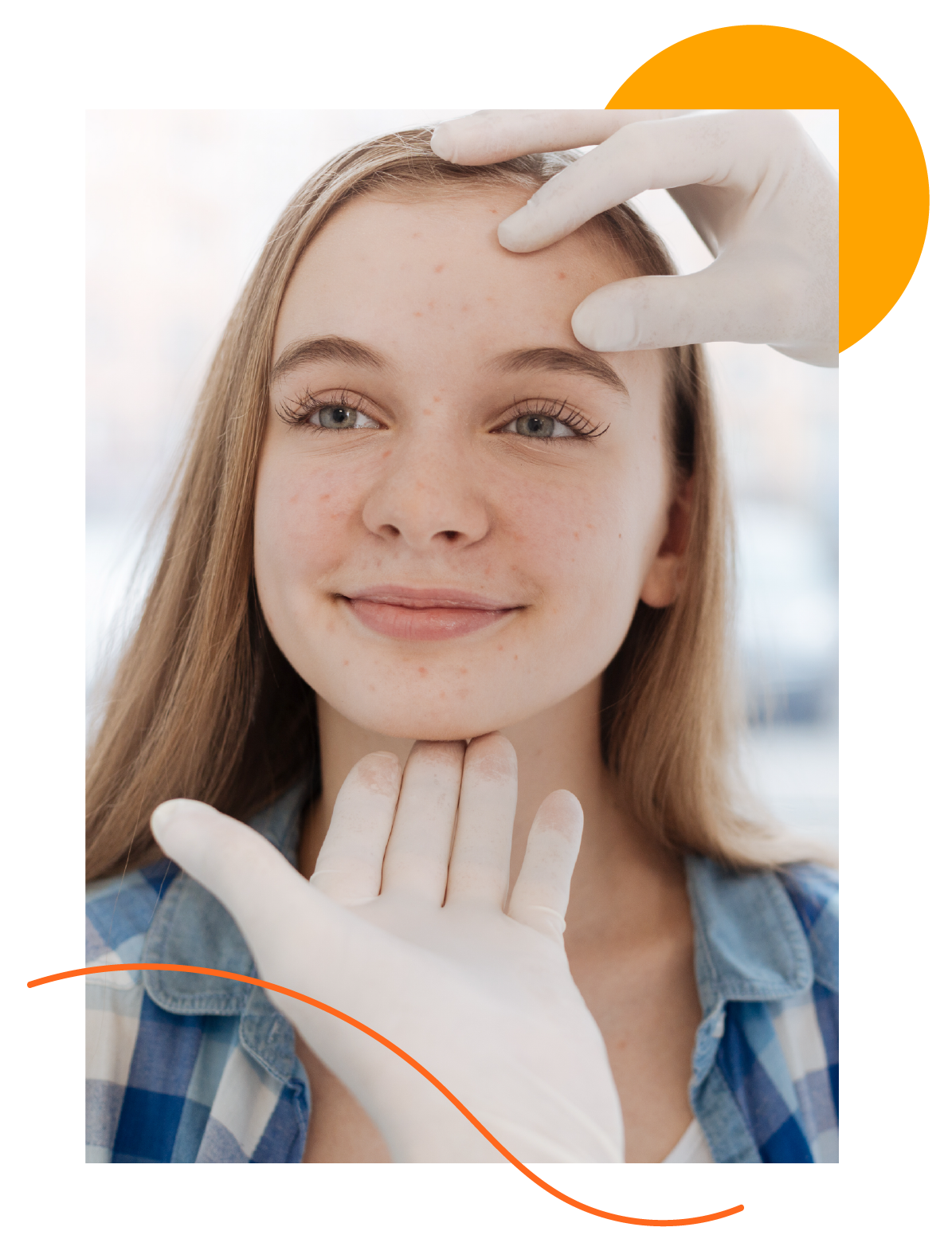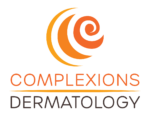PSORIASIS
Helping You Manage Inflammatory Skin Conditions
Psoriasis is a chronic, inflammatory, autoimmune skin condition distinguished by plaques or areas of red skin that are often covered with white or silvery scales. It is not contagious, and the plaques can form anywhere on the body but most commonly appear on the elbows, knees, scalp and back.
This skin disorder causes cells to multiply at a much faster rate than normal skin cells. The natural progression of healthy skin cells involves the outer layer of epidermal cells being made, pushed up to the surface, a degeneration process and then becoming dead skin cells. In patients with psoriasis, the dead skin cells quickly collect due to the faster production rate, which causes the formation of plaques.
Over 90% of patients with psoriasis experience uncomfortable itching or pain during a flare. The flares can last a few weeks to months and then may subside for a period of time. The plaques can range from a few small scaling spots to large red patches covering a sizable area of skin.
The most common type of psoriasis is plaque, but there are other types producing different symptoms and affecting other areas of the body like:
- Guttate – Usually develops in childhood or young adulthood having small pink spots usually on torso, legs and arms.
- Nail – Many people with plaque psoriasis develop it in their nails.
- Inverse – Usually found in skin folds around the body, sometimes around genitals and buttocks characterized by bright red lesions that are smooth and shiny.
- Pustular – Mostly seen in adults and can be either localized or cover most of the body with yellowish blisters of noninfectious pus surrounded by red skin.
- Psoriatic – An inflammatory, autoimmune condition that can affect both the joints and skin
- Erythrodermic – Severe form of psoriasis affecting most of the body surface area with fiery redness of the skin and shedding of scales in sheets.

Cause of Psoriasis
It is speculated that an overactive immune system plays a large role in causing psoriasis. An overactive immune system triggers inflammation in the skin causing cells to grow rapidly compared to normal skin. The new and fast formation of skin cells pushes the old skin cells to the surface forming the plaques and scales that are visible on the skin. Genetics also plays a role in developing psoriasis. If you have family members with the skin disorder, you are more likely to develop the skin condition.
Psoriasis Triggers
In most cases of chronic skin conditions, there are environmental triggers that can cause exacerbations of symptoms. Some of the common triggers of psoriasis include:
- Smoking and/or exposure to secondhand smoke
- Vitamin D deficiency
- Stress
- Cold weather with low humidity
- Injury to the skin like a bug bite, scrape, sunburn
- Excess alcohol consumption
- Certain prescription medications
- Infections like strep throat or skin infections
Symptoms of Psoriasis
The symptoms will depend on the type of psoriasis you have. The symptoms may vary from person to person, but the most common symptom is thick, raised, red plaques or patches on the skin that may develop white or silvery scales. Other symptoms include:
- Skin, especially the plaque areas, become dry, crack and bleed
- Plaques or small patches join together to form larger areas
- Itching, burning or pain sensations during plaque formation
- Swollen or stiff joints as in the case of psoriatic arthritis
Diagnosing and Treating Psoriasis
The providers at Complexions Dermatology are focused on restoring the health of your skin and helping you manage inflammatory skin conditions that can interrupt your lifestyle. We will work with you to develop an individualized treatment plan designed to address your unique and personal needs.
One of our top priorities is to make an accurate diagnosis of your skin condition which will help direct the best course of treatment. When diagnosing psoriasis, we will evaluate your skin and if the symptoms are unclear, we may take a small sample of skin, called a biopsy to further evaluate under a microscope. Once the diagnosis is made, we can prescribe an effective treatment plan that will help you manage your symptoms and help to reduce flare-ups.
We understand the physical discomfort and emotional stress that can occur with having psoriasis. Complexions Dermatology will partner with you in determining the best treatment options for your unique symptoms in an effort to reduce the impact it can have on your life. While there is no cure, treatments can provide relief during flare-ups and help to minimize or slow the growth of plaques. Some of the treatments include:
- Liberal application of topical creams or ointments onto the affected skin can provide relief for mild to moderate psoriasis while possibly avoiding the systemic oral medication. Topical treatments include:
- Corticosteroid creams to relieve itching, reduce inflammation and minimize the production of cells
- Salicylic acid ointment can be applied to the plaques to help lift the scales to remove them and soften the affected skin
- Vitamin D ointments and creams help to slow the production of new skin cells. It has been shown to work well when combined with other treatments such as a topical corticosteroid cream.
- Retinoids applied topically can help speed up the shedding of skin cells and may help improve psoriatic conditions.
- Systemic medications are available for people with moderate to severe psoriasis and who did not respond to topical treatment. There are side effects to some systemic medications and therefore are used for short durations of time.
- Sunlight or UV light has been shown to improve psoriatic conditions by attacking the overactive white blood cells causing rapid cell growth.
Complexions Dermatology of Danville and Colonial Heights, Virginia is pleased to provide expert care in the diagnosis and treatment of psoriasis. We understand the impact it can have on the many aspects of your life and we look forward to working with you to help manage the symptoms of psoriasis which, in turn, will help restore your self-confidence and quality of life. Call us today at our Danville location (434) 792-0423 or our Colonial Heights location (804) 805-8442 to schedule your consultation at Complexions Dermatology.




